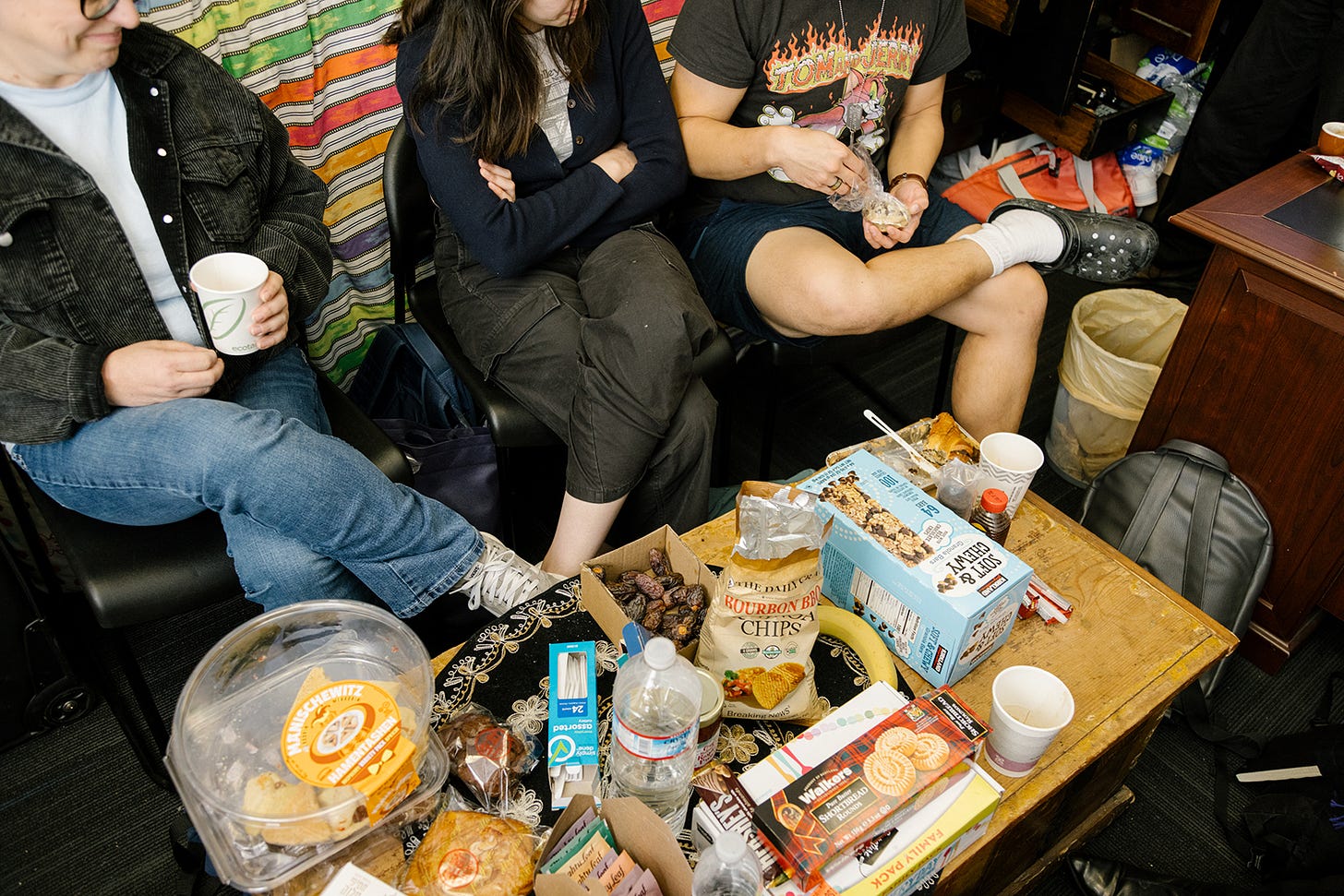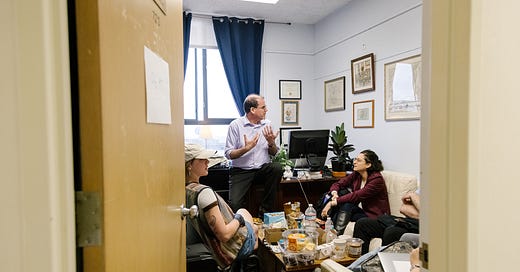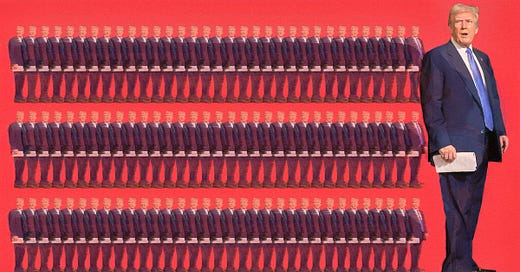
The Free Press

BERKELEY, CA — Ron Hassner’s UC Berkeley office, on the seventh floor of the Social Sciences Building on the south side of campus, is slightly bigger than a one-car garage. It’s generous by administrative standards—Hassner has been a political science professor at Berkeley for twenty years—but it’s not a domicile.
When I got there at three p.m. on Monday, Hassner, who is six feet, four inches, had been living there for the past 93 hours. It’s not because he was evicted. He is there because he is staging a sit-in protest to bring attention to a rising tide of Jew-hatred on campus—and the administration’s inaction in the face of it.
When I texted Ron to ask if I could come visit him, he texted back: “bring Febreze.”
“I’m a scholar. I don’t believe in activism,” Hassner tells me when I get there, pacing alongside the twin-size mattress leaning against his bookshelf. (I met Ron—in typical California college fashion, he corrects students who call him “professor”—a year ago, when he led a trip to Israel to study military history.) At 53, Hassner marched in his first protest only earlier this month—something of a miracle by Berkeley standards—when he joined a San Francisco march against antisemitism. “I don’t know how to do any of this,” he says. “I don’t have a rulebook that I’m following.”
All he knew, when he announced on March 7 that he would be shacking up in his office, was that something had to be done.

His Jewish students were scared. They were telling him so. The word Zionist had become a slur on campus. The middle section of Sather Gate, a central fixture on campus, had been blocked by pro-Palestinian protesters for the last month with yellow tape, chains, and posters. Student organizers blared sounds of drones and bombs with megaphones throughout the day. Jewish students say they have been filmed and harassed by the anti-Israel activists camped out there.
Then, on February 26, things got violent.
That night a handful of pro-Israel groups on campus attempted to host an event with an Israeli lawyer, Ran Bar-Yoshafat. A handful of the school’s pro-Palestine groups swarmed Berkeley’s Zellerbach Playhouse where it was taking place. “It was a riot,” Sharon Knafelman, 20, a political science major, tells me at an off-campus café, a gold Jewish star dangling from her neck.
“I saw my friend get spat at and called a dirty Jew,” she says. “They shouted at us that we were pigs. They were violent with some of us: two girls got assaulted, they ended up shattering the windows.” One student’s wrist was injured, requiring her to go to urgent care, while another says she was choked trying to keep other students out of the hall where the event was taking place.

The day after the riot, Chancellor Carol Christ and Provost Benjamin Hermalin issued a statement condemning the riot as “transgressive.” On March 4, they announced that the University of California Police Department, Berkeley was launching investigations for hate crimes and physical battery. One suspect has so far been identified for trespassing. But Knafelman told me that tracking down the students would be difficult as the protesters “wore surgical masks, or they wore their keffiyehs over their faces to cover their identity.” The event with Ran Bar-Yoshafat went on at an off-campus Chabad house; the students were escorted through tunnels with police escorts to safety.
Knafelman told me that since October 7 the environment on campus has been “uncomfortable, ostracizing, and isolating to the point where I think that we really only feel safe in spaces like Chabad.” She expressed frustration with the administration, which she believes hasn’t taken sufficient action to stop discrimination and harassment against Jews on campus. “We shouldn’t have to go through so much bureaucracy and so much back and forth to try to simply get them to do their job of ensuring our safety.”
Hassner, the professor living next to his desk, agrees. And he has a few demands—he calls them “requests”—of the administration.

“My first request at university: please find a permanent way to keep Sather Gate open. My second request to the university is that if a speaker is shouted out, and has to leave campus without giving their talk, no matter if they’re Palestinian or Israeli, no matter if they are right wing or left wing, that they receive an apology from the university and that they be invited back. And my third request was that the university provide Islamophobia and antisemitism training to staff. These are my requests, and they strike me as reasonable.”
Until then, he will sleep on the mattress on the floor and teach his 100-person “War in the Middle East” class over Zoom. (His five-person graduate seminar will meet in his office.) Ron uses the bathroom down the hall and does not shower; he showed me his wet wipes in his makeshift bedside cabinet—another, smaller bookshelf. His dress shirts are hung on his door handle. His son and daughter, both teenagers, bring him food from time to time.
He keeps a lamp on his window, facing Berkeley thoroughfare Bancroft Way, at all times. He wants students to see that at least one professor is “sleeping as badly at night as they are.”

In the office, students—both Jewish and not—trickled in and out, nibbling at cookies and assorted pastries brought or sent to Ron. Fruit baskets and the remains of Shabbat dinners sent from supporters around the country crowded his small coffee table. He offered everyone who came in coffee or tea. I counted four teaching awards on his office walls. There are also maps of Vienna, his birthplace, and Jerusalem, and a long bookshelf lined with plants and stuffed with political philosophy and Agatha Christie, on top of which he keeps his pillows.
When I asked Ron about his Israeli background—he moved there as a child and served in an intelligence unit in the IDF—he cut me off. “It’s not relevant.”
“I know that in a world of identity politics, it really matters who you are. Isn’t it a terrible shame that the only people who are willing to stand up to antisemitism are Jews?”
I talked with a Jewish student who’d come to visit Ron and who told me that lately, she’s been eating by herself in her sorority house. “ ‘Oh, that’s the girl who supports genocide,’ ” others would say of her, she told me. “All of my friends in sororities complain about the same thing.” She’s lost most of her friends who aren’t pro-Israel Jews. Another student chimed in that she overheard a girl say “I support Hamas.” Ron cuts in: “Why didn’t you ask for details?” Later, a law student came in to bring Medjool dates from the kibbutz he worked at in Southern Israel.
Ron expected his sit-in to be “monastic”—he compared the project to sitting Shiva, the Jewish mourning ritual, in which the family of the deceased receives guests at home. But it’s more like a party—or at least a place for students to finally relax. He shows me a guest book where he’s encouraging visitors to sign their names. Yesterday’s page had around 90 signatures. “And yesterday was not a busy day,” he told me.

Ron Hassner doesn’t have a view of Sather Gate from his office, but that iconic site, where the Free Speech Movement began, has for weeks been a no-go zone for Jews and Israel supporters thanks to a barrier set up by Bears for Palestine and Graduate Students for Justice in Palestine.
On the day I visited campus, hundreds of Jewish Berkeley students and community members marched to “Liberate the Gate.” They wore all white and demanded that the university fulfill its most basic obligations: to keep students safe and to enforce its free speech policies, which prohibit blocking the gate.
“This is a campus known for its protest,” Hassner says. “Put up propaganda! Hang it everywhere! But don’t physically block students from walking. Don’t harass them. Please don’t strangle them. I think it’s possible to advocate for the Palestinian cause without strangling people.”

Later, at Sather Gate, I met Allison, a third-year economics major, who wouldn’t give me her last name. “I think people should continue protesting because it is a genocide,” she says.
A senior with heavy black eye makeup who is majoring in interdisciplinary studies and who, citing privacy, declined to give me her name, told me that she thought Zionist students “have balls for just sitting there,” referring to pro-Israel groups who had set up tables in the center of campus. When I asked her about pro-Israel groups on campus, she said: “I don’t personally think there should be Zionists, period.” I bring up the fact that there are Zionists on campus, and that they say they feel unsafe. “I don’t necessarily say that’s particularly undeserved.”
In this, the students at Berkeley reflect the broader atmosphere of Jew-hate that’s swept the Bay Area since Hamas’s October 7 attack. San Francisco, a city 7,500 miles from Gaza, passed a cease-fire resolution in early January. On February 28, the Anti-Defamation League filed a federal complaint against Berkeley Unified School District for ignoring pervasive antisemitism. At least 30 families have pulled their children from Oakland Unified for the same reason.
Then, on March 5, UC Berkeley received a letter from the Department of Education announcing that it was investigating antisemitism on campus.
“We’re committed to full cooperation with the investigation,” university spokesman Dan Mogulof said. Of Ron Hassner, Mogulof has written, “The administration is committed to confronting antisemitism and holds Professor Hassner in great esteem and it is in conversation with him about his concerns.” Hassner told me that administrators had even stopped by his office. But UC Berkeley did not respond to The Free Press’s request for comment.
At around 5:30 p.m, Hassner’s wife, a Berkeley faculty member in the business school, brought him updates on Sather Gate, a homemade salad in Tupperware, and a Dyson vacuum cleaner.

At six p.m., Ron approached the door and added a fifth tally mark, for day five of the sit-in. “I’m in my pajamas on a mattress in my office smelling bad,” he reflects, when I ask him what he thinks about all the press interviews and the hundreds of emails pouring in every hour. “It’s a bit of a nebbish protest, right? I’m not out there giving big speeches. I’m not dressed in a beautiful suit standing in front of an audience of 7,000.”
After I left, he had a call with doctors in San Francisco whose patients were dealing with antisemitism in hospitals. Then, another interview. At around eleven p.m., he would place his mattress on the floor and go to bed. He doesn’t sleep well on the floor of his office, he tells me. He’d likely be woken up by a student knocking.
For more on the riot at UC Berkeley, read Greg Lukianoff and Angel Eduardo: “If Berkeley Wants to Protect Free Speech, It Will Expel Its Rioters.”
Julia Steinberg is an intern at The Free Press. Read her last piece on the college dropout who unlocked the secrets of ancient Rome using AI. And follow her on X @Juliaonatroika.
And if you appreciate our coverage of campuses, antisemitism, and higher education, consider becoming a Free Press subscriber:














Freedom To Offend
Freedom to Offend
just now
I'm in Canada and it's worse here. What bothers me is not just the creeping authoritarianism and censorship, it's the way that so many people actually support it. Their thinking is neaderthal: well that's not nice, they shouldn't say that, and we should force them to stop it. It's that basic. I am a professor/lecturer under suspension for a LI response to a guy who was calling for the extermination of Israel. I had just watched the Hamas massacre videos, and I wasn't feeling too jocular. I said I stood with Israel and said if you stand with Hamas, you stand with Nazis and then listed the less than glorious accomplishments of Hamas—presto - Human Rights Complaint against me. I've been suspended for four months and banned, banished, threatened, and defamed, I regret nothing, but some actual anti-semite (hundreds of posts, a lover of Hamas, the Houthis, dictators, hater of all thing Western) had a human rights complaint and he has had nothing happen to him, nothing, he's on campus, they've ignored it for six weeks and in six days with me they were shaking with rage at me, I am now accused (for my post) as a violent threat, accused of assault at school (when I was at home as I was banned from school), they have shredded me. And the VP has told her staff that I will be fired even though they are doing this Orwellian (I would say Kafka, but it's just trying to be smart; I haven't read him since high school, and I know his character became a dung beetle, that's it) They have lawyers threatening me, my table is stacked with paperwork. Everyone says I will be fired, everyone. And the real anti-semite, nothing. But I don't think he should be fired, I think he's a nasty racist ass but I don't think he should be fired. Seriously, free speech isn't a thing anymore, it's not, it's off with their heads. They take themselves so seriously. I'm supposed to meet some investigator; I will tell her off the entire two hours and tell her she's an idiot; I don't care. But my question is, the uni only cares about me talking to the media; they are obsessed; I'm not concerned about them getting their panties in a bunch (oh no, shouldn't say that), and if they want to fire me, they will, and we will see what the union does. But I don't have a lawyer anymore; she got too busy, and I'm not inclined to follow their stupid NDA. I told them truthfully I was on too much morphine when I signed because of kidney stones; it's a creative excuse; do they get to silence me? I'm tired of it. The union idiots want me to show remorse, but I'm not doing it. It's not only the societal ignorance on what free speech is, but it's these pompous twits with their serious faces acting me like I've been running a child slave ring; it irks me. If they fired me, could they throw me in jail for talking? I'm not signing any NDA, and I'm not shutting up. As a nation, we don't value free speech anymore; we are a nation of idiots. https://nationalpost.com/opinion/teacher-fights-back-suspended-denouncing-hamas
Calling it a phobia, or irrationalional fear, IS Nazi-ish.